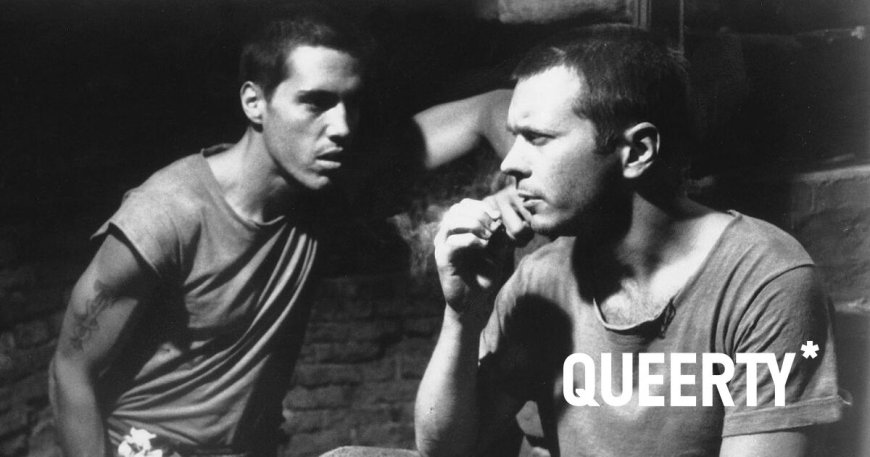Gay filmmaker Todd Haynes’ debut was an erotic prison drama, body horror, and tabloid fodder all in one
In his controversial feature debut, Todd Haynes offered up a cinematic threeway on "otherness."


Welcome back to our queer film retrospective, “A Gay Old Time.” In this week’s column, we revisit acclaimed writer-director Todd Haynes’ first feature, 1991’s Poison, an artful triptych on otherness.
It’s not uncommon for film directors to revisit the same themes and ideas over and over throughout their careers. In fact, it’s something that probably pours out of them unconsciously. It’s not hard to find common threads between the types of ideas, characters, and narratives that they choose to revisit over the years.
This is of course easier to do in retrospect; looking back at a director’s filmography and finding the thematic and narrative seeds in their early works that would sprout later as their career took off. With the value of hindsight and time, we’re able to not only more easily identify the patterns that emerged in the films, but also contextualize them within the filmography, and even reassess their original reception and reactions.
This weekend sees the release of Todd Haynes’ latest film, the tabloid melodrama May December, starring Natalie Portman as an actress that pays a visit to the woman she’ll be playing in a movie (Julianne Moore), who years before was entangled in a tabloid scandal.
So, it’s a perfect time to look back at Haynes’ earliest work, his 1991 feature film debut Poison, and set it against the body of work that he has created since. It comes to no surprise that the ideas that he first brought up in Poison—particularly around the perils of traditional community and the isolating feeling of being labeled an “other”—kept coming back in his films.
The Set-Up(s)
Poison is a film that’s structured as a triptych of three separate narratives, each completely separate in character, story, and style, but connected by key themes and ideas:
In the first one, labeled “Hero,” we see the sensationalist recount of seven-year-old Richie, who kills his father for abusing his mother, and then jumps out of a window and flies off afterwards. This segment is told in tabloid documentary style, with talking heads of Richie’s family, neighbors, and classmates recounting just how “special” and “different” he used to be. They remember how cruelly other kids treated him, but now that he’s gone, they remember him fondly; particularly his mother.
The second segment, labeled “Horror”, tells the story of a scientist that is trying to create an elixir of pure human sexuality, and in the process becomes horribly disfigured. He becomes an outcast among his peers, and soon grows violent against his community. He becomes known as the Leper Killer and is forced into isolation, equally feared and mocked. This portion is in black and white, and stylistically resembles a noir or horror movie from the first half of the century. Like an episode of The Twilight Zone.
The final segment, entitled “Homo”, features a young prisoner in a juvenile facility dealing with the burgeoning and overwhelming desires that arise for his peers in an environment that is as homoerotic as it is homophobic. His fellow inmates give in to his desires as much as they fight back against them. This is told in a more heightened and surreal style, with hints of traditional narratives like Old Hollywood melodramas, and more radical works like the abstract films of Derek Jarman.
Three-way Storytelling

The three stories never intersect, but they are intercut with one another, as if to say that they inform and feed into each other. All three contain the key element of their respective protagonists being pushed against the conventional structure that they are part of (a suburban group of family and neighbors, a community of academic peers, the prison system) for being “different.”
Their differences manifest in various ways: a gifted boy that was relentlessly bullied for it, a doctor that becomes mutilated, and a man that is fighting his deepest desires. In the end, all of them give into the thing that made them stand out, and are forced to stop fighting the rigorous restrictions put upon them—with some endings some more tragic than others.
Body Of Work

However, looking back at Poison more than three decades later, the themes it explores have far expanded beyond just these three narratives, and have spilled into every one of Haynes’ subsequent movies:
That sense of paranoia, fear, danger, and claustrophobia that arises within traditional structures like the nuclear family or the suburbs are further explored in [Dafe], Far From Heaven, Dark Waters, and May December. Outcasts that are being rejected by a community (whether they are looking to belong or not) are the focus of Carol, Wonderstruck, and Velvet Goldmine.
And nearly all of his films feature a heavy layer of desire, longing, and repressed passion; from Carol and Therese looking at each other across a department store and Julianne Moore breaking away from her predetermined housewife existence with an affair, to Ewan McGregor finding solace in the glitter and shine of glam rock and Natalie Portman desperately trying to find an ounce of meaning and depth in an old tabloid sensation.
His characters are always trying to find something (anything) beyond the scraps of life that are put in front of them.
Related:
“I made something that is outside the box” Todd Haynes on crafting a thriller with ‘Dark Waters’
Plus, the meaning behind Haynes’ masterpiece, ‘Velvet Goldmine.’
The Haynes Code

That feeling, that deeply queer theme that one is meant for something else, something bigger and truer and more alive than the circumstances you are born into, recurs over and over again in his work. Haynes keeps exploring the ways it appears and flares up through different characters, stories, and genres; domestic melodramas, music biopics, legal thrillers…
But it was all right there from the start. All the marks and beats that have continued to repeat themselves throughout the years were present (and in some ways, more alive and raw) in Poison.
But, as one of the most interesting and invaluable filmmakers of today, Todd Haynes makes it feel different every time. Here’s to many more.
Poison is now streaming via Amazon Prime Video, Kanopy, and Metrograph.
Related:
Charles Melton is the breakout hottie of what’s sure to be every gay’s new favorite movie
The ‘Riverdale’ star is receiving raves for his performance in ‘May December,’ the new film from ‘Carol’ director Todd Haynes .

 Mark
Mark 







